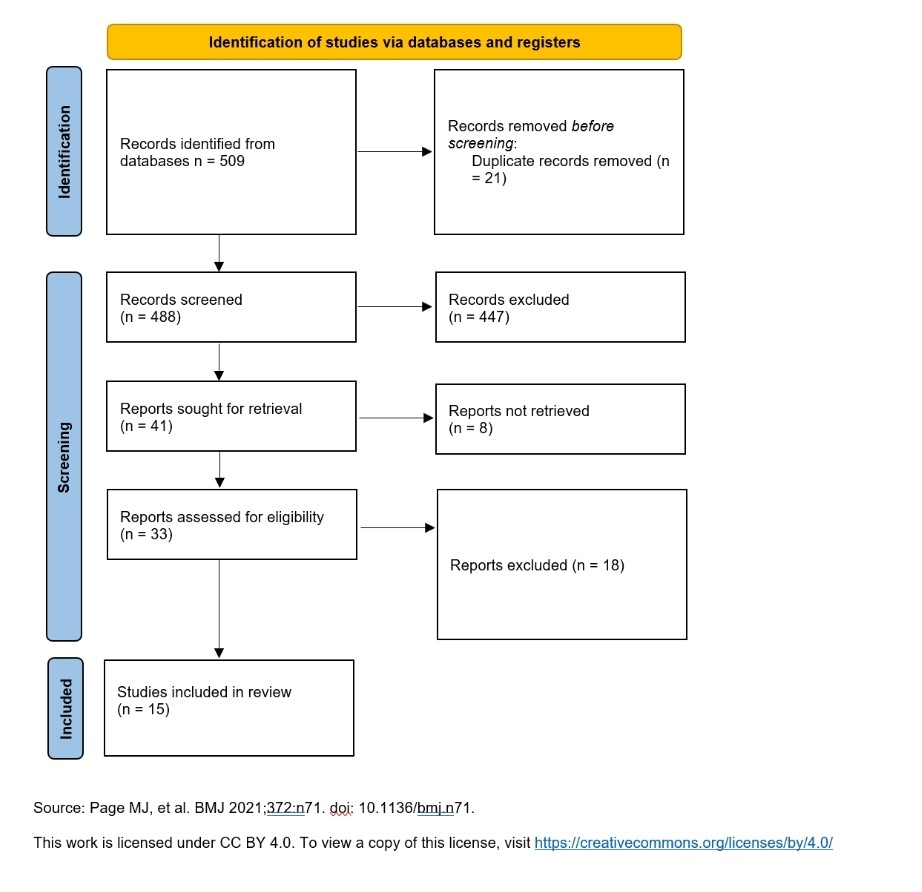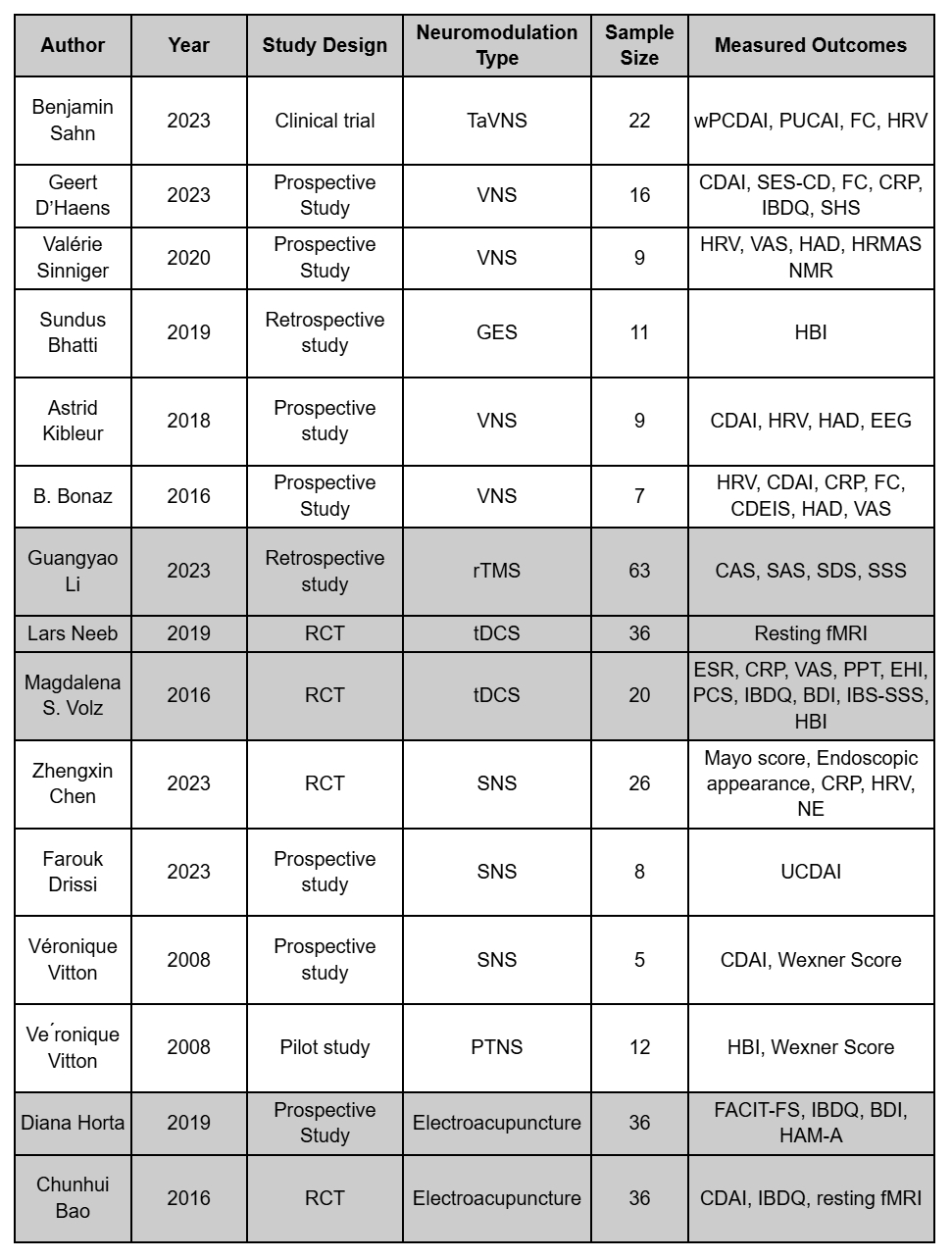Sunday Poster Session
Category: IBD
P1187 - Evaluating the Role of Neuromodulatory Techniques on Clinical Outcomes in Inflammatory Bowel Disease: A Systematic Review
Sunday, October 26, 2025
3:30 PM - 7:00 PM PDT
Location: Exhibit Hall
- GR
Greeshma Rangari, MBBS (she/her/hers)
Government medical college Nizamabad
Sangareddy, Telangana, India
Presenting Author(s)
Greeshma Rangari, MBBS1, Navya Sree Keshetty, MBBS2, Pravalika Meka, MBBS3, Ridhinayani Nalam, MBBS4, Sai Krishna Bhupalwar, MBBS5, Rahul Yadav KRISHNA. Sawaiwar, 6, Anum Z. Khan, 7, Sanjana Palakodeti, MBBS8
1Government medical college Nizamabad, Sangareddy, Telangana, India; 2Government Medical College Nizamabad, Hyderabad, Telangana, India; 3Government Medical College , Nizamabad, Nizamabad, Telangana, India; 4Government Medical College, Nizamabad, Nizamabad, Telangana, India; 5Government Medical College Nizamabad, Nizamabad, Telangana, India; 6Independent, Adilabad, Telangana, India; 7Jinnah Medical Dental College, Karachi, Sindh, Pakistan; 8Kamineni Institute of Medical Sciences, Hyderabad, Telangana, India
Introduction: Traditional treatments for IBD, such as biologics and immunomodulators, have limitations such as severe side effects, non-adherence, persistent symptoms, and psychological comorbidities, highlighting the need for alternative therapies. Neuromodulation offers a novel therapeutic approach targeting the gut-brain axis to modulate inflammation and mental health outcomes in IBD.
Methods: A systematic search of PubMed, Embase, and the Cochrane Library was conducted.
RCTs, prospective studies, and retrospective studies were included. Due to significant heterogeneity in study designs and outcomes, a meta-analysis was not feasible. Instead, thematic synthesis was performed based on proposed mechanistic pathways.
Results: A total of 15 papers were included: 5 on VNS, 3 on rTMS/tDCS, 3 on SNS, 2 on electroacupuncture, and 1 each on GES and PTNS.
Discussion: Vagal-based approaches (e.g., VNS, taVNS) were the most consistent in reducing biomarkers like CRP and FC through activation of the cholinergic anti-inflammatory reflex. They also showed significant reductions in disease activity indices (CDAI, CDEIS) and, in some cases, psychological burden, suggesting a dual benefit on the gut-brain axis.
Brain-directed techniques like tDCS and rTMS primarily impacted pain and mood, aligning with their mechanism of cortical modulation. Though these therapies did not improve objective disease markers, their impact on quality of life and central sensitization may make them valuable adjuncts in refractory pain management.
Pelvic neuromodulation via SNS and PTNS provided tangible benefits in continence and rectal sensation in patients with perianal disease or sphincter dysfunction, offering a rational option where pharmacotherapy alone is insufficient.
More traditional methods like electroacupuncture and moxibustion also demonstrated anti-inflammatory and neuromodulatory effects.
While these results are encouraging, most studies had small sample sizes, with non-standardized stimulation protocols, and were heterogeneous in outcomes, limiting cross-study comparisons. Future trials must define optimal patient selection, stimulation parameters, and consistent outcomes.

Figure: Prisma 2020 Flow Diagram

Figure: Summary of Selected Studies
Disclosures:
Greeshma Rangari indicated no relevant financial relationships.
Navya Sree Keshetty indicated no relevant financial relationships.
Pravalika Meka indicated no relevant financial relationships.
Ridhinayani Nalam indicated no relevant financial relationships.
Sai Krishna Bhupalwar indicated no relevant financial relationships.
Rahul Yadav Sawaiwar indicated no relevant financial relationships.
Anum Khan indicated no relevant financial relationships.
Sanjana Palakodeti indicated no relevant financial relationships.
Greeshma Rangari, MBBS1, Navya Sree Keshetty, MBBS2, Pravalika Meka, MBBS3, Ridhinayani Nalam, MBBS4, Sai Krishna Bhupalwar, MBBS5, Rahul Yadav KRISHNA. Sawaiwar, 6, Anum Z. Khan, 7, Sanjana Palakodeti, MBBS8. P1187 - Evaluating the Role of Neuromodulatory Techniques on Clinical Outcomes in Inflammatory Bowel Disease: A Systematic Review, ACG 2025 Annual Scientific Meeting Abstracts. Phoenix, AZ: American College of Gastroenterology.
1Government medical college Nizamabad, Sangareddy, Telangana, India; 2Government Medical College Nizamabad, Hyderabad, Telangana, India; 3Government Medical College , Nizamabad, Nizamabad, Telangana, India; 4Government Medical College, Nizamabad, Nizamabad, Telangana, India; 5Government Medical College Nizamabad, Nizamabad, Telangana, India; 6Independent, Adilabad, Telangana, India; 7Jinnah Medical Dental College, Karachi, Sindh, Pakistan; 8Kamineni Institute of Medical Sciences, Hyderabad, Telangana, India
Introduction: Traditional treatments for IBD, such as biologics and immunomodulators, have limitations such as severe side effects, non-adherence, persistent symptoms, and psychological comorbidities, highlighting the need for alternative therapies. Neuromodulation offers a novel therapeutic approach targeting the gut-brain axis to modulate inflammation and mental health outcomes in IBD.
Methods: A systematic search of PubMed, Embase, and the Cochrane Library was conducted.
- Population: adults with IBD (CD or UC);
- Intervention: neuromodulatory techniques including VNS, taVNS, SNS, tDCS, TMS, and electroacupuncture;
- Comparison: sham stimulation or standard care
- Outcomes: clinical disease activity indices (CDAI, UCDAI), inflammatory biomarkers (CRP, fecal calprotectin), pain scores, psychological symptoms, and quality of life.
RCTs, prospective studies, and retrospective studies were included. Due to significant heterogeneity in study designs and outcomes, a meta-analysis was not feasible. Instead, thematic synthesis was performed based on proposed mechanistic pathways.
Results: A total of 15 papers were included: 5 on VNS, 3 on rTMS/tDCS, 3 on SNS, 2 on electroacupuncture, and 1 each on GES and PTNS.
Discussion: Vagal-based approaches (e.g., VNS, taVNS) were the most consistent in reducing biomarkers like CRP and FC through activation of the cholinergic anti-inflammatory reflex. They also showed significant reductions in disease activity indices (CDAI, CDEIS) and, in some cases, psychological burden, suggesting a dual benefit on the gut-brain axis.
Brain-directed techniques like tDCS and rTMS primarily impacted pain and mood, aligning with their mechanism of cortical modulation. Though these therapies did not improve objective disease markers, their impact on quality of life and central sensitization may make them valuable adjuncts in refractory pain management.
Pelvic neuromodulation via SNS and PTNS provided tangible benefits in continence and rectal sensation in patients with perianal disease or sphincter dysfunction, offering a rational option where pharmacotherapy alone is insufficient.
More traditional methods like electroacupuncture and moxibustion also demonstrated anti-inflammatory and neuromodulatory effects.
While these results are encouraging, most studies had small sample sizes, with non-standardized stimulation protocols, and were heterogeneous in outcomes, limiting cross-study comparisons. Future trials must define optimal patient selection, stimulation parameters, and consistent outcomes.

Figure: Prisma 2020 Flow Diagram

Figure: Summary of Selected Studies
Disclosures:
Greeshma Rangari indicated no relevant financial relationships.
Navya Sree Keshetty indicated no relevant financial relationships.
Pravalika Meka indicated no relevant financial relationships.
Ridhinayani Nalam indicated no relevant financial relationships.
Sai Krishna Bhupalwar indicated no relevant financial relationships.
Rahul Yadav Sawaiwar indicated no relevant financial relationships.
Anum Khan indicated no relevant financial relationships.
Sanjana Palakodeti indicated no relevant financial relationships.
Greeshma Rangari, MBBS1, Navya Sree Keshetty, MBBS2, Pravalika Meka, MBBS3, Ridhinayani Nalam, MBBS4, Sai Krishna Bhupalwar, MBBS5, Rahul Yadav KRISHNA. Sawaiwar, 6, Anum Z. Khan, 7, Sanjana Palakodeti, MBBS8. P1187 - Evaluating the Role of Neuromodulatory Techniques on Clinical Outcomes in Inflammatory Bowel Disease: A Systematic Review, ACG 2025 Annual Scientific Meeting Abstracts. Phoenix, AZ: American College of Gastroenterology.
